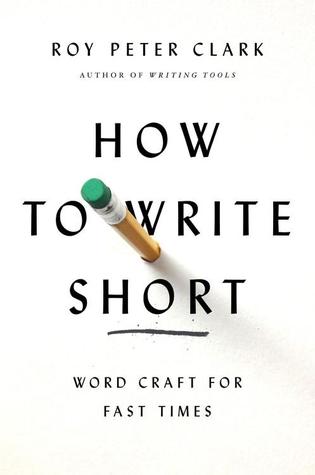Time once again for the Progressive Book Club! I thought I was going to have to punt on my writing-related posts, but thanks to a lot of time sitting in airports, I not only finished reading
but I even got a response written and--this is important, as you'll see in a moment--edited.
Title: How to Write Short: Word Craft for Fast Times
Author: Roy Peter Clark
Publisher: Little, Brown, 2013. 272 pages.
Source: Library (ebook)
This thought-provoking little book should be discussed in tweets and haikus. If I had more time,I would. Being short of time, I shall pick out a few key ideas and riff on them. Clark has made this easy by dividing his book into very short chapters, each followed by a set of assignments for the writer to practice brevity.
Clark first really got my attention with Chapter 8, "No Dumping." (Given the brevity of the chapters, this was only minutes into the book.) The chapter appeals to my possibly somewhat anal conviction that no piece of writing should go out into the world without edits (no, I don't edit my diary. I don't share it, either). The rule applies all the more, Clark makes clear, to short writing. If a piece of writing is both short and unedited, odds are it doesn't make much sense. The goal is to use the fewest possible words to do the job.
Assignment #1 from Clark to me and my readers: "Make a list of the informal texts you would be least likely to revise: emails, tweets, status updates, website feedback, instant messages. Resolve that for one week you will refrain from dumping these on your readers and will take a few seconds to correct and improve." Take the vow along with me.
In Chapter 18 Clark discussed the 6-word memoir project*. The obvious assignment #2: write your own. One of my efforts: "Always wanted to write. I do."
In Chapter 19, Clark asks us to consider if we are putter-innerspring or a taker-outers. Do you put in everything including the kitchen sink and then edit out the unnecessary bits, or frame the bare bones and expand? I vote for both: my stories often draft as bare bones, my sentences have the kitchen sink. When I rewrite, I often shrink the sentences and expand the stories. Which are you (or what combo)?
A final assignment: write aphorisms, adages, and epigrams. Those are among the classic very short forms of writing. They also strike me as a great use of twitter for an author. Have fun with it: "I fought the slaw, and the slaw won. #needcleanshirt"
Oh, yeah: write t-shirt mottos, too. I almost bought one this weekend at the Book Festival: "Oops. I accidentally bought another pile of books."
Shakespeare said it best: brevity is the soul of wit. I believe that's wit as in intelligence, as well as humor. Funny that I think of Shakespeare as using a lot of words because really, writing in iambic pentameter constrained him far more than I constrain myself! And every word he used had to be chosen for meaning and meter.
So there are your PBC assignments. Feel free to share the results in the comments!
Oh, and since I ended up with some spare time, the haiku review:
Fewer words may serve
Vital communications
Better than you think.
*If you haven't heard of this, Google it. Check out the NPR Race Card project while you're at it.
Full Disclosure: I borrowed Writing Short: Word Craft for Fast Times from my (digital) library, and received nothing from the writer or publisher in
exchange for my honest review. The opinions expressed are my own and
those of no one else. I am disclosing this in accordance with the
Federal Trade Commission's 16 CFR, Part 255: "Guides Concerning the Use
of Endorsements and Testimonials in Advertising."
###########
In related news: only six days left to enter to win a paperback copy of Death By Ice Cream.



A very fun way to think about words and writing to the point. Thanks for sharing this book!
ReplyDeleteMany examples were hilarious, too. One-liners are short writing, after all!
DeleteThis sounds like a good craft book. I'm keeping a list of these for my MFA program.
ReplyDeleteGiven how much I like words (lots and lots of words), it seemed a good one for me to look at, even though I'm not really interested in haiku nor Tweeting, for that matter (unless I open a Twitter account to post one-liners).
DeleteAnd I already broke my vow to edit blog responses. Sigh. We'll call the above a sort of negative model. I wonder how many parenthetical clauses I could put in a single sentence if I really let myself go?
DeleteThis comment has been removed by the author.
ReplyDeleteOK. My review of Death By Ice Cream is now:
ReplyDeleteIt's fab - scoop it up!
:D. (And brilliant edit, too)
ReplyDelete